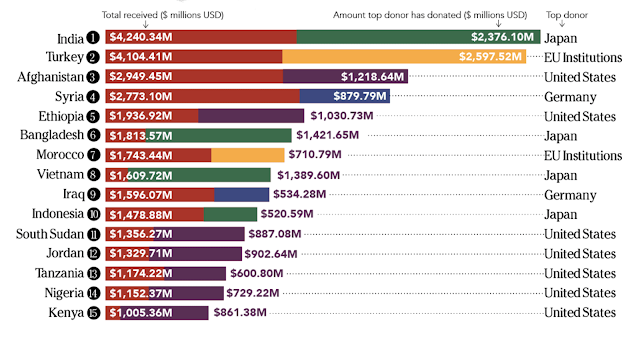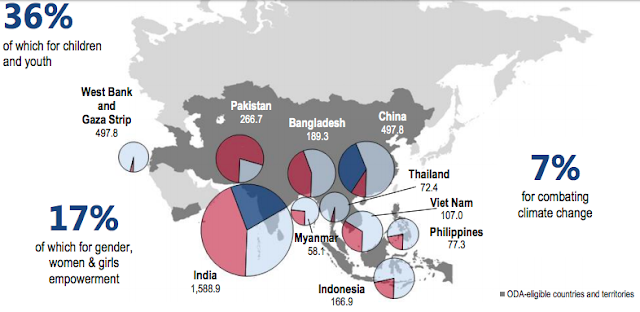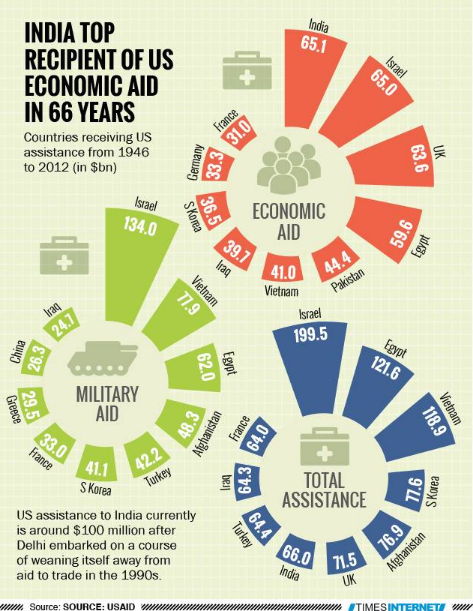PakAlumni Worldwide: The Global Social Network
The Global Social Network
India Top Recipient of Private Charity; Pakistan Ranks 12th
India tops the list of charity recipients from private foundations while Pakistan is ranked as the 12th largest recipient of philanthropic giving in the world, according to a report released by OECD (Organization for Economic Co-operation and Development).
Global Philanthropic Foundations:
Philanthropic contributions of major international private foundations in Pakistan totaled $267 million out of the $42 billion global contribution in 2013-2015. This compares with $1.6 billion in top-ranked India and $498 billion in second-ranked China. US-based Bill and Melinda Gates Foundation (BMGF) contributed nearly half of the $42 billion in global charity by private foundations.
Private foundations are filling the huge gaps in public funding of health and education sectors in developing nations. . They contributed $11 billion for the health sector alone in the three year period, ranking third behind the United States and a global fund for fighting disease.
Massive Western Aid to India:
In addition to being the biggest recipient of private foreign charity, India has been the number one recipient of official US aid since 1947, according to the US government data. The country India's first Prime Minister turned to for help during the 1962 China-India war was also the United States.
India has received $65.1 billion in US aid since its independence, making it the top recipient of American economic assistance. Pakistan, with its $44.4 billion, is at number 5 on the list. US data also shows that Pakistan is not among top 10 for military or total economic and military aid.
 |
| Top Aid Recipients and Their Donors in 2017. Source: Wristband Reso... |
Local Charity in Pakistan:
Pakistanis donate generously to local charities in the country in the form of religiously mandated donations such as "zakat, sadaqa and fitrana". One of the key measures of empathy is generosity to others, the kind of generosity demonstrated in Pakistan by the likes of late Abul Sattar Edhi. The Edhi Foundation set up by the great man is funded mainly by small donations from ordinary people in Pakistan.
Anatol Lieven, author of "Pakistan: A Hard Country" wrote the following tribute to the Mr. Edhi:
"There is no sight in Pakistan more moving than to visit some dusty, impoverished small town in an arid wasteland, apparently abandoned by God and all sensible men and certainly abandoned by the Pakistani state and its elected representatives - and to see the flag of Edhi Foundation flying over a concrete shack with a telephone, and the only ambulance in town standing in front. Here, if anywhere in Pakistan, lies the truth of human religion and human morality."
What Professor Anatol Lieven describes as "human religion and human morality" is the very essence of the Huqooq-ul-Ibad (Human Rights) in Islam. Abdus Sattar Edhi understood it well when he said, "there's no religion higher than humanity".
Edhi understood the meaning of what the Quran, the Muslim holy book, says in chapter 2 verse 177:
"Righteousness is not that ye turn your faces towards the east or the west, but righteous is, one who believes in God, and the last day, and the angels, and the Book, and the prophets, and who gives wealth for His love to kindred, and orphans, and the poor, and the son of the road, beggars, and those in captivity; and who is steadfast in prayers, and gives alms."
A recent article written by Shazia M. Amjad and Muhammad Ali and published in Stanford Social Innovation Review said that "Pakistan is a generous country. It contributes more than one percent of its GDP to charity, which pushes it into the ranks of far wealthier countries like the United Kingdom (1.3 percent GDP to charity) and Canada (1.2 percent of GDP), and around twice what India gives relative to GDP."
OECD says corporate donations in Pakistan have increased from $4.5 million to $56.4 million over the last 15 years. Corporate donations are dwarfed by individual donations made as zakat, sadaqa and fitrana as commanded by the Quran.
In addition to zakat, sadaqa and fitrana, Pakistanis spent about $3.5 billion on Eid ul Azha in 2017, according to analysts. This included sacrifice of $2.8 billion worth of livestock and another $700 million on clothes, shoes, jewelry and various services. This amount represent a huge transfer of wealth from urban to rural population, including many rural poor, in the country. It also brings philanthropic donations of Rs. 2.5 billion to Rs. 3 billion ($25-30 million) worth of animal hides which are sold to the nation's leather industry.
Empathy Study:
A Michigan State University (MSU) study of 63 countries finds that Pakistanis have higher empathy for others than people in their neighboring countries. It also finds that the United States is among the most empathetic nations in the world.
The MSU researchers, led by William J. Chopik, analyzed the data from an online survey on empathy completed by more than 104,000 people from around the world.
The survey measured people’s compassion for others and their tendency to imagine others’ point of view. Countries with small sample sizes were excluded (including most nations in Africa). All told, 63 countries were ranked in the study, according to MSUToday, a publication of Michigan State University.
Summary:
Pakistanis are among the most generous people in the world. They contributes more than one percent of the nation's GDP to charity, which pushes Pakistan into the ranks of far wealthier countries like the United Kingdom (1.3 percent GDP to charity) and Canada (1.2 percent of GDP), and around twice what India gives relative to GDP, according to Stanford Social Innovation Review. Average Pakistanis continue to be empathetic and generous in spite of the violence and the terror they have endured for over a decade. It can only be attributed to the strength of their faith and their adherence to what Prof. Lieven describes as "the truth of human religion and human morality".
Related Links:
Study Says Pakistanis Have Higher Empathy Than Neighbors
Comparing Median Wealth and Income in India and Pakistan
-
Comment by Riaz Haq on November 4, 2018 at 4:33pm
-
OUTRAGE as #India spends £330 MILLION of £1billion #UK foreign #aid on GIANT BRONZE #StatueOfUnity. BRITONS are outraged after the Indian government spent hundreds of millions of the £1.17billion of overseas aid sent to them by the UK. #Modi #patel http://shr.gs/SrNnexe
While the UK was sending India £1.17billion in aid, the Indian government was spending nearly half of that on the world’s tallest statue.
This new statue is twice the height of the US’ Statue of Liberty and has been met with condemnation for the large bill that it carried.
Over the 56 months it took to build India’s Statue of Unity, the government spent around £330million of UK taxpayer’s aid.
It stands in Mr Modi’s home state of Gujarat at the bend of the Narmada river.
The Prime Minister was the chief minister of Gujarat when the statue was first commissioned.
Construction began in 2012 when the UK sent India nearly £300million.
Then, in 2013, the UK sent another £268billion followed by £278million in 2014 and £185million in 2015.
Since then, the UK has sent India smaller sums.
While this money was coming in, India was spending much of it to build the 579ft bronze replica of a hero of India’s independence movement, Sardar Patel.
In response to this, Tory MP Peter Bone said: “To take £1.1billion in aid from us and then at the same time spend £330million on a statue is a total nonsense and it is the sort of thing that drives people mad.
“What it proves is that we should not be giving money to India.
“It is up to them how they spend their money but if they can afford this statue, then it is clearly a country we should not need to be giving aid to.”
The aid money was also spent on various programmes ranging from improving women’s rights to funding solar panels to investment in low-carbon transport.
In 2014, around £14,000 was spent in Gujarat to increase religious tolerance among young people.
While the UK did not directly fund the statue, the money was spent on programmes that the government could not have afforded if they had been using their own money on building the statue.
It took 3,500 workers four years to build and it also saw a massive land-grab that affected 72 nearby villages that, according to tribal chiefs, forced thousand out of their homes.
Upon its unveiling, helicopters flew overhead and dropped rose petals during Mr Modi’s speech.
Britain’s former International Development Secretary Andrew Mitchell said in 2012 that the UK would stop ending India aid in 2015, but £92.6million was sent to India last year.
-
Comment by Riaz Haq on August 31, 2020 at 4:44pm
-
#Japan gives emergency loan of 50 billion yen (almost Rs 3,500 crore) to help #India deal with #COVID19 crisis. It is the largest amount of aid announced by any country so far to help India amid widespread impacts on the #economy and #health sector. #Modi https://www.hindustantimes.com/india-news/japan-announces-emergency...
Japan announced on Monday it will extend a emergency support loan of up to 50 billion yen (almost Rs 3,500 crore) to back India’s response to the Covid-19 crisis, including implementation of health and medical policies and development of hospitals equipped with ICUs.
Japanese ambassador Satoshi Suzuki, and CS Mohapatra, additional secretary in India’s department of economic affairs exchanged notes regarding the provision of the yen loan for the response to the Covid-19 emergency.
A statement issued by the Japanese embassy noted that the Indian government has taken several measures, including health sector reforms, in response to the spread of Covid-19. “This loan provides the necessary funds for emergency response in the fight against Covid-19 in India,” it said.
This is the largest amount of financial assistance announced by any country so far to support India’s response to the Covid-19 crisis, which has had widespread impacts on the economy and health sector.
The “Covid-19 crisis response emergency support loan” will back the “implementation of health and medical policy by the government of India, and will lead to the development of hospitals equipped with ICUs and infection prevention and management facilities, which are undersupplied in India”, the statement said.
“It is also expected to lead to the enhancement of telemedicine using digital technology in numerous villages across India. It is expected that these measures, in addition to controlling the spread of infection in the country, will also contribute to the recovery and stability of the country’s society and economy, as well as to sustainable development,” the statement added.
The terms and conditions of the loan include an interest rate of 0.01% per annum and a redemption period of 15 years, including a four-year grace period.
Suzuki and Mohapatra also exchanged notes for the provision of grant aid worth 1 billion yen under Japan’s Official Development Assistance scheme for India’s Economic and Social Development Programme, which is being implemented by the health ministry.
“This programme will provide oxygen generators to government of India. Oxygen generators can be employed for the treatment of Covid-19 patients under critical conditions. This programme will lead to the strengthening of India’s infectious disease countermeasures, as well as her health and medical systems,” the Japanese embassy said.
In a separate development, the Japanese embassy and consulates and Japan External Trade Organisation (JETRO) updated the list of Japanese businesses in India with the cooperation of Japanese chambers of commerce and industries in India.
As of October 2019, the total number of Japanese companies registered in India is 1,454. The number has increased by 13 (0.9% growth), compared to 1,441 in 2018.
The total number of Japanese business establishments in India, as of October 2019, is 5,022, a decrease by 80 (1.6% decline) as compared to 5,102 in 2018.
West Bengal and Haryana showed the largest increase in the number of Japanese companies. There was a significant increase in the number of companies in such sectors as information and communications as well as services.
The manufacturing sector accounted for half of the total Japanese companies and more than a third of Japanese business establishments in India.
“The total number of establishments decreased while the number of companies increased, because some companies became non-Japanese due to the closure of office, corporate restructuring, change of ownership etc,” said a statement from the Japanese embassy.
Comment
Twitter Feed
Live Traffic Feed
Sponsored Links
South Asia Investor Review
Investor Information Blog
Haq's Musings
Riaz Haq's Current Affairs Blog
Please Bookmark This Page!
Blog Posts
Pakistani Student Enrollment in US Universities Hits All Time High
Pakistani student enrollment in America's institutions of higher learning rose 16% last year, outpacing the record 12% growth in the number of international students hosted by the country. This puts Pakistan among eight sources in the top 20 countries with the largest increases in US enrollment. India saw the biggest increase at 35%, followed by Ghana 32%, Bangladesh and…
ContinuePosted by Riaz Haq on April 1, 2024 at 5:00pm
Agriculture, Caste, Religion and Happiness in South Asia
Pakistan's agriculture sector GDP grew at a rate of 5.2% in the October-December 2023 quarter, according to the government figures. This is a rare bright spot in the overall national economy that showed just 1% growth during the quarter. Strong performance of the farm sector gives the much needed boost for about …
ContinuePosted by Riaz Haq on March 29, 2024 at 8:00pm
© 2024 Created by Riaz Haq.
Powered by
![]()



You need to be a member of PakAlumni Worldwide: The Global Social Network to add comments!
Join PakAlumni Worldwide: The Global Social Network